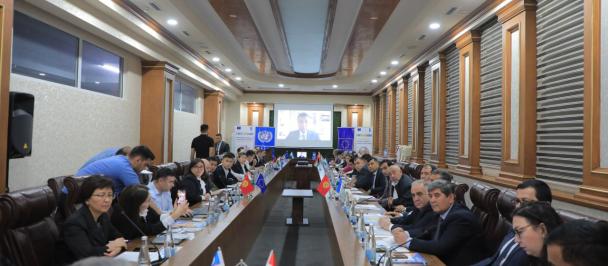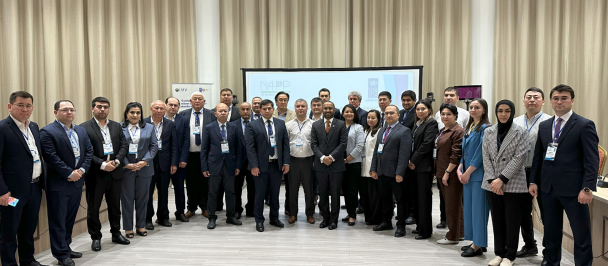April 22, 2021
Address by Matilda Dimovska, UNDP Uzbekistan Resident Representative, at the 'Tashkent Law Spring' II International Legal Forum
April 22, 2021
Image: UNDP Uzbekistan
I congratulate the Ministry for convening us around the topic of Law in the era of the Fourth Industrial Revolution. This is a topic that is very important, as we all need to work together to shape the sustainable future that we want for Uzbekistan and its people. This is the same future that all countries are shaping now, as they explore policy options towards resilient recovery from the COVID pandemic.
Building a resilient and modern society requires full understanding of the benefits and risks of new technologies. UNDP has supported digital transformation in many countries, and we have seen how digital and tech could significantly accelerate human development. How countries embrace and adapt to technological changes will also determine and help advance their efforts in meeting the promise of 2030 Agenda and achieve the SDGs.
We have seen how technology and digitalization have transformed human behavior. Imagine how different lifestyles and routine functions were ten years ago, compared to now where smart phone and technology are abundant in our everyday lives. The trends of the 4-th industrial revolution will bring even more multiple changes to economies, societies, people, and their system and behavioral interactions. This is true regardless of whether one lives in an advanced economy, or a developing economy.
The 4th Industrial revolution therefore offers opportunities, risks and challenges, and where the government and legal community’s role will be significant:
Technology can accelerate development, but without clear people-centered regulatory frameworks, there is a risk that power and decisions will be made by technology and its owners, thereby deepening inequality, digital divide and further fragmenting societies.
Personal security, data privacy, freedom of choice and expression of individuals and local communities can be put under risk.
Certain traditional jobs are particularly vulnerable to automation from current or future technologies. Recent UNDP / EIU study flags that this figure for Uzbekistan is 55%.
AI and automation have public sector implications, from reducing government bureaucracy to optimising service design and delivery. Data-driven public services can be a boon in healthcare provision. But there are also risks, like embedding of ethnic and gender biases in algorithm based public services (such as policing and justice). In other words – it can “bake in” prevalent biases from the past into the future.
Fourth industrial revolution may bring new kinds of public and private disputes before the courts as well as help administer judicial decisions involving individuals and companies. Futurists are noting how perhaps court cases could be resolved without going through a formal court procedure, and how AI may even replace a judge in the future.
McKinsey estimates that 23% of work done by lawyers can be automated. That means not only reducing the traditional legal professions like legal secretaries, paralegals, but also new legal jobs.
What do these mean therefore for all of us?
Most importantly, we need to fully understand and be prepared for these changes and challenges. The key question is to which ends the new technologies are put and the extent to which these risks are managed; and used as opportunity to advance human development.
Effective governance, rule of law, protection of human rights, transparency and anti-corruption, and agility are key to handle and maximize the benefits of new technologies for the promise of the 2030 Agenda to be met. The legal industry has a very significant role to play here.
First, the legal industry needs to be fully aware of the potential implications of the 4th industrial revolution to governance, systems, people and the social contract as a whole. We recognize that there are still many unknowns, but we have seen already for example how digitalization and tech have led to rise of alternative legal service providers in many countries. We need to recognize these trends, and how these can inform a new narrative that focuses on people-centered development.
Second, we have seen how agile institutions were able to respond effectively to the pandemic. The legal industry, and the judicial system overall, need to consider how digital and tech could provide agile measures that could more effectively engage the public and stakeholders in legal and policy formulation, monitor their implementation and assess their impact through digital platforms including through the use of big data, provide real-time measures for participating in court procedures online, and use applications such as AI and blockchain to reduce court backlogs. In Uzbekistan, we have such example - the E-sud electronic case management system for civil cases, developed by the Supreme Court, with support of USAID and UNDP.
Third, digital and technology offer opportunities for strengthening accountability in the public sector as well. The role of Parliaments for example, with regard to representation, oversight, and legislation, could be tremendously advanced by digital solutions. Transparency in budgeting, public financial management and procurement could be enhanced through automation and digitalization. At the same time however, we need to recognize the importance of intellectual property, patents, anti-trust law, media law and consumer protection laws to accelerate fair and competitive use of innovations for public good.
Fourth, we have also seen how digitalization and tech could be used to feed misinformation, disinformation and hate speech. These are issues that are very important to address, particularly with regard to their intersection with human rights and freedom of expression.
Finally, we need to consider what these all mean for the educational modules and curricula in law universities, to ensure that new legal professionals are adequately prepared for the challenges and opportunities that the 4th industrial revolution brings to the legal industry.
Let me close with a challenge and encouragement to all legal professionals to understand, embrace, and adopt the opportunities and benefits of the 4th industrial revolution. Not for the sake of being in the forefront of technology and digitalization, but more importantly, to be able to play your incredibly valuable role in helping the country and the people recover sustainably from the Covid pandemic, and in building a new and fairer world, for the humanity and the planet. No one must be left behind in development progress, and you have important roles to play in making this happen.
I hope we will touch upon these important issues and relate them to Uzbekistan!
Thank you for your attention!

 Locations
Locations





